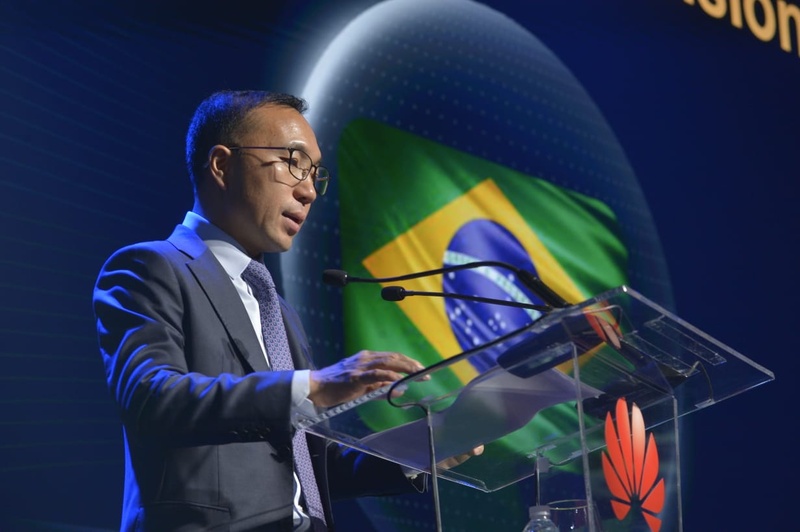According to the white paper, every additional dollar invested in cloud computing beyond the average value of US$$700 million can increase GDP by US$$4.

Gao Kexin, CEO of Huawei Brazil, at the Huawei Cloud Summit, during the report launch.
Huawei Cloud, a leading global leader in cloud computing and artificial intelligence solutions, has released the white paper “Cloud Computing: Moving Towards an Intelligent World”, highlighting the revolutionary role of the cloud in the global digitalization process.
Cloud computing has a significant multiplier effect on economic growth. According to an exponential regression analysis between cloud investment and global GDP, each additional dollar invested in cloud computing beyond the median of US$1.7 billion can increase GDP by US$1.4 billion.
The text establishes a common goal of digital accessibility and intelligence, based on three pillars (governments, industries and digitalized societies) and with security as a structural foundation. The document was released during the Huawei Cloud Summit 2024, held in São Paulo.
The report is based on the “1+3+1” concept, which is a vision of how cloud computing can transform the world:
- 1 shared goal: Make technology accessible and useful to everyone, improving lives.
- 3 main pillars:
- More efficient governments: delivering fast, affordable services like digital healthcare and smart cities.
- More modern companies: using technology to create innovative products and services.
- More connected society: improving education, commerce and even entertainment.
- 1 security base: ensure that everything is done with data protection and security.
This positive impact stems from several factors: cloud computing encourages the construction of infrastructure, such as data centers and networks; it expands the digital economy, creating new jobs related to the cloud lifecycle, such as planning, integration and maintenance; it transforms traditional sectors, improving efficiency, quality and reducing costs; and it reduces entry barriers for startups, fostering new services and business models that generate more job opportunities.
Furthermore, for every 10 direct jobs created in the cloud sector, another 55 indirect jobs are created, highlighting its importance as a driver of sustainable development.
Technology is also seen as essential for energy efficiency. Cloud-based data centers can significantly reduce energy consumption compared to traditional models, supporting the ecological transition.
The report emphasizes the need for “cloud-first” policies to accelerate digital transformations. Governments are encouraged to invest in technological infrastructure, promote the use of artificial intelligence and foster inclusive digital ecosystems. With more than 80 countries already adopting “cloud-first” policies, the report highlights examples of direct impact, such as Brazil’s telemedicine system, which benefits 60% of the population, and M-Pesa, a mobile banking service in Kenya, which increased financial inclusion from 26% to 84% of the population in 15 years.
Among the success stories, Brazil stands out with the creation of the Digital Government Secretariat, which leads the digital transformation in the country. The initiative achieved results such as the digital provision of 100% of public services by 2023, benefiting more than 150 million citizens. In addition, 30 government data centers were migrated to the cloud, ensuring greater efficiency and security.
Standardized procurement has led to more transparent contracts and significant cost reductions, while digital services such as electronic identity cards and social benefits for vulnerable populations have boosted social inclusion. Gov.br has also achieved a satisfaction rating of 90%, resulting from the integration of 4,986 digital services across 221 government agencies.
Other success stories include the adoption of e-government platforms in Singapore and smart city initiatives in Dubai, which have significantly improved public services and citizen satisfaction.
Zhang Ping'an, CEO of Huawei Cloud, reiterated the company's commitment to leading the way in building an intelligent future by investing in innovation and collaborating with governments and industries. "We urge all industries to seize opportunities, make good use of the cloud, and embrace AI to jointly promote global digitalization," he stressed.
About Huawei Cloud:
Huawei Cloud brings Huawei’s over 30 years of technical expertise in ICT technology, innovation, and infrastructure to its customers. More and more businesses are growing with the stability, security, and continuous improvement of affordable services provided by Huawei Cloud, including AI. With a powerful computing platform and easy-to-use development platform, Huawei Cloud supports full-stack AI strategies for any scenario.
For more information, visit Huawei online or follow us:













